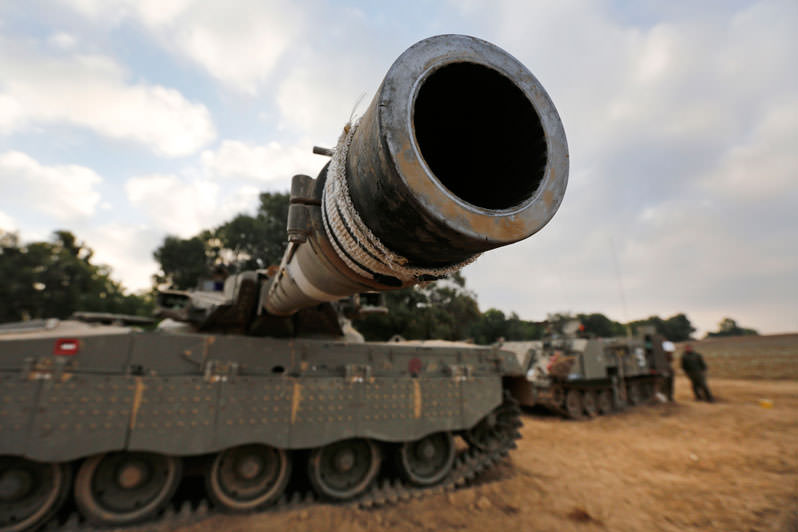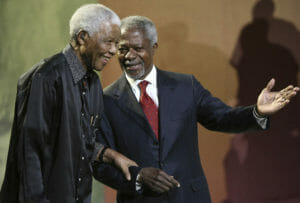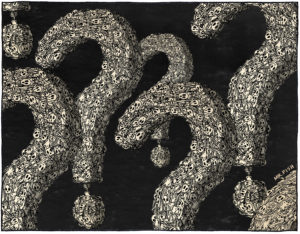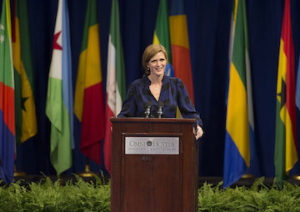Gaza as Sarajevo
The image of Israeli tank columns safely ranged on the periphery of Gaza methodically lobbing in round after round of supposedly precision-guided munitions (precision, that is, give or take the odd 25 person civilian family huddled together for the breaking of their Ramadan fast), sent me whistling back to my own time in Sarajevo, after the lifting of the siege there in the wake of the Dayton Accords in late 1995. AP Photo/Lefteris Pitarakis
AP Photo/Lefteris Pitarakis
AP/Lefteris Pitarakis
Strange the things that stick in the craw.
After the publication earlier this week of my Truthdig commentary about Israel’s repetitively compulsive and rabid behavior (“Israel Has Been Bitten by a Bat”), I got a lovely note from a dear longtime friend who was in general and quite anguished agreement with much of what I’d written. But, perhaps not surprisingly, given that he is considerably more of a Zionist than I’ve ever been (a longtime theme in our relationship), he took particular umbrage at my suggestion that the nearly 2 million Palestinians bottled up in Gaza were living in what was for all intents and purposes a concentration camp — not a death camp, mind you, but hardly different from the notorious sorts of conditions Japanese-Americans had been subjected to in World War II, or Boers during the Anglo-Boer wars, or Sowetans under apartheid, or (and this is clearly what got to him), for that matter, the kinds of conditions Jews and gays and gypsies and the like were subjected to at Dachau and Theresienstadt in the years before the Nazis themselves settled on their Final Solution.
Several others, after the publication of the piece, had commented that a fitter analogy might be to the Warsaw Ghetto (a hideously overcrowded, enclosed and besieged space regularly subject to lethal tank sweeps), but my friend Joel weighed in:
You yourself have commendably drawn a distinction between a death camp and a concentration camp. But you need to take note of a further distinction: between a concentration camp and a besieged urban population living in a two-way (even if still asymmetrical) military confrontation.
Now that I reread his note, that characterization might well equally apply to the Warsaw Ghetto, but in response at the time, I wrote back, “So you mean something like Sarajevo in the nineties?” It was a parallel with which, he in turn, was willing to concur, going on himself to note how this was hardly “a happy analogy.”
Indeed. That exchange, and some television footage later the same afternoon of Israeli tank columns safely ranged on the periphery of Gaza methodically lobbing in round after round of supposedly precision-guided munitions (precision, that is, give or take the odd 25 person civilian family huddled together for the breaking of their Ramadan fast), sent me whistling back to my own time in Sarajevo, after the lifting of the siege there in the wake of the Dayton Accords in late 1995.
And in particular to the peculiar late night conversations I used to have with Nikola Koljevic, the vice president of the Bosnian Serbs, in his dilapidated makeshift fastness up there in the little cow town of Pale in the mountains high above Sarajevo, which had served as the capital of the Bosnian Serbs and from which they had supervised the relentless shelling of their onetime hometown, prone and prostate there in its steep valley down below, through the nearly 1,500 days of the siege.
“Siege!” he would thunder mawkishly, downing yet another draft of sour red wine. “What siege? We were the ones under siege. They kept boiling up from out of the valley to attack us at every point. They had us surrounded 360 degrees!” A neat piece of mathematical jujitsu, that, and in turn reminiscent of the way so many Israelis nowadays characterize their Palestinian counterparts. (What is it with these guys? Why do they keep attacking our clenched hands with their tensed up neck muscles?)
The thing about Koljevic that so used to bewilder the visiting reporters during the months of the gruesome siege when he would hold court up there in Pale is that he was hardly anyone’s standard image of a partisan thug (which is doubtless one of the reasons the Bosnian Serbs liked parading him before the cameras). On the contrary, back in the days before the war, he’d been a distinguished Shakespeare professor at the University of Sarajevo (hell, he’d even served a stint as a Fulbright scholar at Wayne State University!) and he used to love entertaining his late night visitors with extended recitations from his No. 1 favorite Shakespeare play of all time, which was, I shit you not, “Romeo and Juliet.” Completely, but completely, oblivious to the peculiarity of that specific choice in that particular context.
And indeed it took a while for me to come to understand that far from being some bizarre tic in his formation, Koljevic’s passion for Shakespeare was a key to his understanding of what he’d been doing up there in Pale lo these many years. The whole war, for him, had been a desperate last ditch stand to save the future of the possibility of Shakespeare for a Europe, as he saw it, under siege from the massing Muslim hordes (of which his largely secular onetime fellow citizens down below he considered merely the first lappings of a steadily advancing tide). Much as Israelis too like to fancy theirs as a bastion of Western cosmopolitan democratic civility and culture in a sea of fanatically barbarous anti-democratic menace lapping all about them, notwithstanding the fact that the Palestinians too, at least at the outset, were by and large among the most secularly mild of Muslims (the ones that are Muslims, since many are in fact Christians): hence the relentless need for their own tough, and tougher than tough, vigilance and response.
AP Photo/Lefteris Pitarakis
(Incidentally, a few months later, in January 1997, back in Belgrade, under somewhat mysterious circumstances, the good Shakespeare professor committed suicide, who knows exactly why.)
The thing is, back in my days reporting in the former Yugoslavia (see in particular my New Yorker Letter from Belgrade in the Feb. 10, 1997, issue, since included in my “Vermeer in Bosnia” collection), I often found myself thinking about Israel. And I don’t think I was alone. The breakup of the former Yugoslavia was immensely perplexing for many Jews. For one thing, historically the Serbs had been the good guys, particularly during the partisan struggles of World War II when they had made common cause with their own Jewish brethren against the more Nazi-allied Croats, saving thousands of them — and their enemies in this current war were not just those same Croats but Muslims as well, for god’s sake! Still, here now came all of these images pouring in over their television monitors of savagely emaciated prisoners huddled behind barbed wire in Serb-run concentration camps, along with all those reports of vicious bouts of ethnic cleansing, so reminiscent of the sorts of things they themselves had been subjected to in the Pale of Settlement: Jews generally knew whom to side with, faced with such imagery, and whom to side against. But it was all very confusing, all those crossed historical wires.
And it was more than that for me. Because, time and again, Serb claims on me — how could I, a Jew, not see the similarity of their situation to that of my brother Israelis in Palestine — forced me to gaze more fixedly and lucidly on the kind of self-justifying rhetoric coming out of Israel and from Israel’s vociferous defenders in the U.S. History seldom ennobles its victims: More often than not, it crazes them, and I couldn’t help but recognize among Israel’s defenders the same kind of brain damage — or rather, as I identified it elsewhere in my reporting, “the bug in the software of the cognitive operating system” — that I so often encountered on my reporting rounds in Belgrade and the Serb rump of the post-Dayton Bosnia. You could be having conversations of sublime subtlety and rationality with your ever so civilized interlocutor, when, all of a sudden, the bottom would fall out of the discourse, and for two or three minutes all was jibbering-mad blood-curdling irrationality till, just as suddenly, the calm veneer of civility returned and all was sweetness and light once again.
So, anyway, I went back and looked at that Yugoslavia piece just now and came upon the following extended passage (again, we are in Belgrade at the time of the first round of student risings against Slobodan Milosevic in the winter of 1996, not so much for having fought the war perhaps as for having lost it):
When it came to the question of moral responsibility for the war, Serbians had, as my crusty cop-reporter pal Vasic liked to put it, “a blind spot the size of Bosnia-Herzegovina.” Or, as I sometimes came to feel, reverting to my computer analogy, a definite bug in the software. Belgraders didn’t want to talk about {the recently concluded war} at all … but if you persisted, it could get to be as if you’d barely finished typing in, say, the word “Srebrenica,” when the screen would spontaneously pox over in a veritable blizzard of frantic rationalizations. “Oh, yeah, but what about….?” What about Cambodia (how come nobody paid any attention to that? why is it always only the Serbs who get picked on?). What about Vietnam (how come no American presidents ever got hauled to The Hague?). What about the NATO bombing runs on our guys (wasn’t that a war crime?). What about the 20 Serb villagers massacred in the environs of Srebrenica in 1992? And what about the Ustasha massacres in 1944? And what about the Turk treachery at the battle of Kosovo in 1389? What about the 10,000 Krajina Serbs who completely disappeared during Operation Storm last year — a total fabrication but an eminently convenient one since it so neatly seemed to balance out the 8,000 Muslims still unaccounted for, and presumed dead, in the wake of Srebrenica. And anyway, how come everybody so easily credits that 8,000-figure, simply because it puts Serbians in a bad light? Has anybody actually seen the 8,000 bodies? And how do you know they didn’t simply go around executing themselves, just to make the Serbs look bad? (After all, Muslims are famous for that sort of thing.) And anyway, what about the German-Vatican conspiracy against the Serbs? What about the famous Trilateral Commission-Council on Foreign Relations plot? {…}
One evening I had coffee with a woman I had met at a screening of Srdjan Dragojevic’s Pretty Villages, Pretty Flames, a withering Catch-22-like satire of the Bosnian War that devolves into the story of a disheveled band of Serbian irregulars holed up in a dead-end tunnel, pathetically pinned down under merciless siege. (Admittedly, an inside-out characterization of the Bosnian conflict.) The woman told me a bit of her life history — she was thirty years old, a kindergarten teacher; she’d been visiting her brothers in the United States during the late eighties when, overcome with homesickness, she’d made what she described as the mistake of her life, returning to Belgrade just as the country fell apart; she hated Milosevic but was otherwise somewhat confused politically. She was a good person. (I’ve often thought somebody should write a book about the Serbs: “When Bad Ideas Happen to Good People.”)
I took my time — it takes a while, talking with Belgraders, especially if you’re an American, before you can establish your credentials, that you’re not some knee-jerk Serb-hater, but I thought I’d done so — and after an hour or so, I hazarded out upon the topic of Srebrenica. “So a couple dozen Muslims were killed,” she shot back defensively. “Why does everybody keep beating us over the head with that?” I suggested it was more than a couple dozen. “Okay, so a couple hundred — it was wartime, what do you expect?” No, I persisted, it was more like several thousand. She hesitated: how did I know? Where was the evidence? I explained that I’d been at some of the mass-gravesites and I’d heard eye-witness testimony of survivors. I described how men were taken off buses by the hundreds, their arms bound behind their backs, paraded to ditches and machine-gunned in cold blood for hour after hour after hour. She was silent for a few moments — authentically shaken, it seemed. Not that she was hearing this for the first time, I don’t think, but maybe that she was being forced for the first time truly to listen and to take it in.
She sighed and steadied herself. “Well,” she replied at length. “I knew someone in Croatia, a Serbian girl working in a restaurant, and one day these bandits came barging in on the place, lined the staff up along a wall, selected one boy at random, killed him, and then told all the others that if they ever so much as breathed a word about it, they’d come back and kill them too.”
I waited for the rest of the story but it gradually became clear that that was it — there was no more. By my expression it must have been evident that I was failing to fully grasp the moral equivalence between the two episodes.
“The point is,” the woman elucidated, “the boy at the restaurant — they stabbed him.”
I still wasn’t getting it.
“They stabbed him! Can you imagine? Stabbed. I mean, the people in Srebrenica, okay, so there were more of them, but at least there they were machine-gunned, so they all died instantly, mercifully. And each individual can only die once. But try to imagine the agony of that poor Serb boy who was stabbed like that for no reason.”
Like I say: Brain damage.
AP Photo/Lefteris Pitarakis
Sound familiar? (“You never hear of a Serb just dying in battle,” I quote my gruff cop reporter pal Vasic a bit later in the piece. “They’re always being ‘butchered’ or ‘slaughtered’ or ‘massacred.’ “) The willful obtuseness, the refusal to acknowledge the basic fellow humanity of one’s counterparts, that their children might be every bit as precious to them as one’s own and worthy of every bit as open and bright a future. The incredible scaffolding of bad faith and ideological rigidity it takes to maintain such obtuseness: the sheer disfiguring drain of it all.
And yes, I know, something like the same could be said of both sides. But just now (as in the case of Sarajevo), I am speaking of the side that is doing the vast majority of the raining down of death and destruction to the tune of (where are we today?) over 600 human souls, the vast majority of them — pinpoint bombing notwithstanding — civilians, and a sizable majority of those women and children.
I could go on, but you get the idea. And please don’t go writing me off as a self-hating Jew. I’m a Jew who likes himself fine, though, as for a few of my fellow Jews these high-strung hothouse days, I’m no longer quite so sure.
Your support is crucial...As we navigate an uncertain 2025, with a new administration questioning press freedoms, the risks are clear: our ability to report freely is under threat.
Your tax-deductible donation enables us to dig deeper, delivering fearless investigative reporting and analysis that exposes the reality beneath the headlines — without compromise.
Now is the time to take action. Stand with our courageous journalists. Donate today to protect a free press, uphold democracy and uncover the stories that need to be told.






You need to be a supporter to comment.
There are currently no responses to this article.
Be the first to respond.